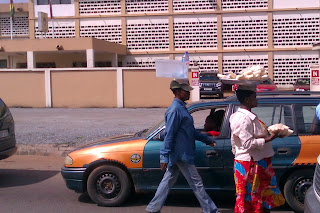 |
| Image: Traffic hawkers busily in the middle of the highway: Accra |

Accra, the capital of Ghana, has become the commercial hub of many citizenry as well as foreigners, such as Nigerians among others. These people in the quest for making a living for their family and themselves embrace (any) work they find, of which traffic hawking is no exception. Users of the highways are bound to see some of the city's mobile vendors greeting motorists and passengers with their goods and wares: pushing them into your vehicle and sometimes begging you to buy them. Any time I observe these traffic hawkers, I remember the adage that 'the struggle of man indeed begins at birth. Since a journey of thousand miles begins with a step, could you please journey with me as I review traffic hawking and the risks involved in the city.
Presently, it is common to see children and elderly between the ages of 10 and 56 meandering through the traffic with their can drinks, sachet water(s), newspapers, among others on the highways all in the name of making a living. Some of these mobile sellers begin their business from Monday to Friday. They come as early as five o'clock in the morning and close six o'clock in the evening. Once the weather is favourable for selling, praise is given to their Creator and work starts immediately until the body calls for a break.
A soft drinks vendor disclosed to me that on daily basis, especially when business is peak, he makes 10 Ghana cedis profit. This vendor hails from the northern region of Ghana. He has come to Accra to seek greener pasture and his fate has employed him in this traffic hawking business. I read from the face of him that traffic hawking is one of the tedious and riskiest job that one can do in the city. But what can he do? He has not got the money for his preferred work: fittering, hence, depends on this work for survival.
Another traffic hawker, Yaw, who also comes from the northern region told me that indeed the economic condition in the city is 'very hard'. He sells mobile phone credits or units. He makes 15 Ghana cedis when business booms. He considers 10 Ghana cedis as a 'bad market'. This young man of 22 years of age rents a plywood kiosk in Accra. He pays 15 Ghana cedis monthly to the kiosk's owner. He does not have light in the it and to worsen his plight, the roof leaks so when it rains he manages to sleep. I asked him if the traffic hawking business is lucrative, he answered; ' hmm..... this work!, I do not have money that is why I am doing this work, if I get money I will stop and look for a good one. In fact, traffic hawking is dangerous!'.
Hawking on the highways of Accra is dangerous. The risk of accidents are inevitable. According to the National Road Safety Commission (NRSC), about 1600 people die annually in Ghana through road traffic crashes. At least four persons are reported killed in road traffic crashes daily. In 2009, five hawkers were killed in road traffic crashes, whilst 2012 and 2013 have recorded eight and six killed hawkers respectively. Traffic hawking tend to disrupt free flow of traffic on the roads, which endangers hawkers' lives. In spite of this, hawkers contend that the harsh economic situation in the capital has kept them on the dangerous highways. They appealed to government to create more jobs for average people like them to also get employed. Traffic hawking is risky, hence, hawkers must be careful in the quest for making a living for their family and themselves in Accra!
Video:Mobile sellers on the busy main road; Accra
No comments:
Post a Comment